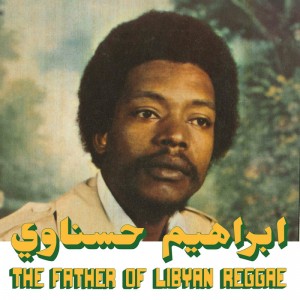Ibrahim Hesnawi
The Father Of Lybian Reggae
About this item
Habibi Funk is digging deep to present the songs of Ibrahim Hesnawi, otherwise known as "The Father of Libyan Reggae." Kingston meets Tripoli in this incendiary collection of Arabized roots, dub, dancehall and more. Featured on Habibi Funk's last compilation (HABIBI015) with his track "Tendme," Hesnawi crafts restless funk with evident buttressing from a reggae foundation. Highlighted across the LP is how Hesnawi essentially pioneered such an effortless synthesis between traditional Libyan music and Jamaican reggae stylings, plus the endlessly disparate funk, jazz, and disco accents which firmly situate Hesnawi in a league of his own. LP out everywhere October 6th.
Some years ago, we started a Facebook group named after our label "Habibi Funk" with the idea to create a space where everyone could share music they felt fit under this umbrella, one way or another. One day a Greek member, Thanasis Moutsopoulos, shared a photo of a vinyl record he found at the Monastiraki flea market in Athens, Greece. It was by a Libyan artist named Ibrahim Hesnawi and called "Hesnawi And Peace." At this point we had never heard of the artist and Thanasis was nice enough to record the album for us. We were immediately electrified by what we heard: A whole album full of classic reggae with some light touches of funk and disco here and there which Hesnawi had recorded in Italy more than 4 decades prior. We eventually decided we would love to learn more about reggae in Libya, and a mutual friend introduced us to Ahmed Abujazia, who was born and still living in Tripolis; through a shared appreciation of music, he agreed to help us work on the project. We asked around and eventually managed to get Ibrahim Hesnawi's telephone number. A few weeks later, Ahmed met Ibrahim in person and proposed our project. Hesnawi was happy to work on a rerelease of his music with us. Excited to share the story of his musical career, Hesnawi was apt to point us towards songs he felt like would be a great match for the tracks we had already expressed interest in. All of this happened in 2018, which was also when the licensing agreement was signed. It has taken us 5 years to actually bring the project to the world, mainly because of the challenge of finding tapes in good enough quality to release. Sadly, Ibrahim Hesnawi lost his studio reel tapes at some point and the digital files he had of his music were of poor quality. So, we spend years trying to find every Hesnawi tape we could get our hands on in order to find a copy that would suffice in terms of sound quality to be used as a source for remastering. Eventually, we had 5-6 copies of some albums, just to identify the ones that sounded the best. We've finally been able to find enough songs in great sound quality that has allowed us to create a selection that both we and Ibrahim were happy with. Now, we're able to share the story of the father of reggae in Libya with the sound quality his work deserves. In many countries, reggae was a widespread fad before its popularity gradually subsided. In Libya, however, the genre remained popular since its initial introduction in the late 1970s. Reggae's thematic throughlines like references to Pan-Africanism, liberation, and the end of oppression and exploitation resonated—and continues to resonate—forcefully amongst a Libyan audience. To this day, you will find countless bands playing variations of the genre as are there Facebook groups with predominantly Libyan members sharing old and new reggae tracks with ten-thousands of members. And no matter who you ask, chances are high that the genre's popularity in Libya will be largely attributed to one man: Ibrahim Hesnawi. Born and raised in Tripolis, the capital of Libya, Hesnawi was not initially interested in music. However, he credits Bob Marley, the universal face of the reggae genre, with changing his mind. Bob Marley was the artist that brought Reggae to Libya. And the two disparate musical cultures—Jamaican and Libyan—weren't so far apart. On the contrary: local musicians intertwined these influences quite fluidly. Libyan reggae borrows elements from its own culture, and is usually accompanied by a steady marching tempo, a significant hallmark of wedding chants. An effortless synthesis of Jamaican reggae and traditional Libyan sonics is featured throughout Hesnawi's catalogue. What better example of this audio amalgam than the LP's powerhouse lead single "Never Understand" which brings a roots and dancehall flavor into conversation with North African and Middle Eastern musical rhythms and Jamaican stylings. With warm keys, a thick, bouncing bass and English lyrics to boot, the track sounds like a missing Bob Marley cut. Fiery funk tracks "Tendme" (featured on HF015) and second single "Watery Al Kabir" bring a tireless groove to the record via chugging rhythms and key interludes that deliver searing harmonic motifs. Focus track "Only World" grounds the LP, placing an emphasis on its anthemic lyricism and subtle, yet slick guitar licks and synth runs that make Libya seem like the "only world" where Reggae continues to stand strong. As always, both vinyl and CD come with an extensive booklet featuring background and interviews with Hesnawi, including unseen photos, scans and more. "Ibrahim Hesnawi: The Father of Libyan Reggae" will be out everywhere October 6th.
TRACK LISTING
1. Never Understand
2. Tendme
3. Only World (feat. Suzan)
4. Kesati
5. Tayr Al Salama
6. Al Hob Wal Salam
7. Fouhi Ya Nesma
8. Enti
9. Watany Al Kabir

